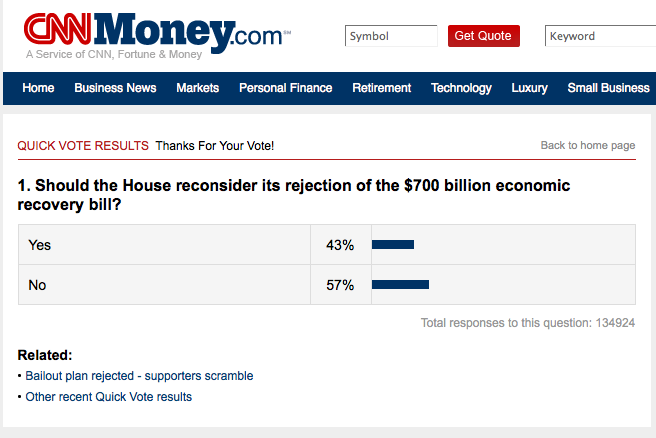A Party in Danger
Last week, the news was aflutter with Rick Perry’s withdrawal from the presidential race. This week, the big story is Newt Gingrich’s victory in South Carolina. If we are to believe the mainstream media channels and the pundit consensus, we may be in for Round 2 of Obama vs. Anyone-But-Obama.
Round 1 involved our current president’s 2008 showdown with John McCain-Not-Obama. McCain garnered 26.6% of eligible votes (down from 28.5% for Bush in ’04), and Obama received 30.8% (up from 27.1% for Kerry). Independents and 3rd parties accrued 0.9%, while the other 41.7% stayed home. The fact that McCain obtained as many votes as he did was a reflection of serious disdain for Obama, rather than an actual base of support for McCain himself. What I heard from most of my conservative friends was “he’s not perfect, but at least he’s not Obama!”
As we look at a possible Round 2, the media and pundits are spouting that Mitt Romney-Not-Obama is the likely nominee, with Newt Gingrich-Not-Obama as an alternate. Actually, he is better known as Newt Gingrich-Not-Romney-Not-Obama. No one I know is particularly pumped about going to bat for Newt; they simply think he’s a more palatable Not-Obama than Romney.
Either option leaves Republicans holding their collective nose and voting for a decidedly non-conservative candidate. In 2008, Democrat contender Barack Obama actually managed to inspire the Republicans more than any candidate within their own party. He stands to do so again.
As has been observed elsewhere, the failure of a single candidate to rally conservatives reveals the deeply-fractured nature of the party. More importantly, though, it reveals that the relationship between Republican leaders and their constituency is on the rocks. In short, the Republican Party is in trouble.
The Nature of the Game
Don’t get me wrong; I’m not a fan of political parties in the first place. At one time, I thought the solution to our two-party mess was to have more parties. More parties equals more choice, right?
Alas, I have come to realize the truth: political parties serve only to limit choice. They do not allow politicians who agree on one issue to cooperate, for fear they’ll be seen as “aiding the enemy.” Parties discourage strong ideological principles in deference to the almighty club membership. Worse than this though, they relegate people to rigid, self-destructive groupthink. The Party encourages members to climb into a box and reject anything beyond those cardboard walls as a possible solution.
From the inception of partisan politics in the U.S., parties served to move our democratic republic away from a nation under the rule of law, guided by the will of the people. We have morphed into a nation under the rule of popular opinion, guided by banks and businesses with close ties to the government.
Let us leave the political world for a moment, and consider a modern professional baseball game. Both teams play by the same rules, and their singular goal is to out-score the opposing team. There is relatively little divergence from one team to another in terms of strategy. Despite all of this, true baseball fans are fiercely loyal to their own teams. No amount of success, roster movement, managerial change, charity involvement, nor any other such factors is going to make a fan of the Boston Red Sox don a Yankees jersey, or vice-versa. In fact, I would wager that these two teams could entirely swap rosters, managers, and owners – so long as they didn’t change the team name and location – and the fan base would remain the same. (I know I’ve just lost some of the baseball people for the rest of this article as they lie on the ground, twitching. No worries, friends – this is all hypothetical!)
While this arrangement is fine for baseball, it has some serious negative consequences when applied to politics. The Republican and Democrat parties as they currently exist are glorified sports teams. The fans are voters, and for far too long, they’ve been very loyal.
The Man Behind the Curtain
During any election cycle, rhetoric abounds about fundamental differences between the parties. If we are to believe politicians, then real ideological differences exist, and the choice for one or the other determines the direction of the nation. For the constituency, this is absolutely true. Some genuinely believe that the government can (and should) help the unfortunate, provide social justice, and keep corporations in line. Others hold that government is incapable of these things, and that the real role of government is to provide a level playing field and to ensure personal liberty.
At the leadership level, this is largely a false dichotomy. Election after election, certain agendas move forward with complete disregard for partisan shifts.
For instance, the debt ceiling almost always increases, regardless of party. The last time the debt ceiling was lowered was almost 50 years ago, in 1963. It was lowered twice that year during the JFK administration, before he was assassinated in November.
Both parties serve to increase the size of government, make military contractors wealthy, pass bailouts recommended by the Federal Reserve, interfere in the politics of other nations, incrementally reduce the freedoms of citizens… it’s a long list.
On display for voters is the narrative that Democrats and Republicans are locked in an epic struggle for control of the political ideology that will steer our nation. Behind the curtain is the ugly truth: This country is being steered in a single direction, regardless of who is at the helm. The only struggle in question is who will be paid to rubber-stamp the heading as Captain, and who will get to dole out the very lucrative contracts associated with maintaining the ship. In the end, the leadership of both parties will be living it up with their friends in First Class. The rest of us toil below decks and argue about which group of aristocrats has our best interest at heart.
Thus, the man behind Oz’s curtain is revealed. The danger is not that wealthy people are in charge, nor that wealth is divided unevenly among the citizenry. The real danger is two-fold: 1) We drones working and living in the common areas are never permitted to leave, to find another ship, nor to influence the direction of the one we’re on. 2) Most of us are completely unaware of our situation and the true nature of the game being played at the top.
The party elite (their “elite-ness” is derived only from connection to the party) truly do not care which group is in charge. They will get their money either way. Goldman-Sachs has no party affiliation. They will dole out contributions to either party as they see fit. Halliburton will continue to get contracts no matter who is in charge. The mainstream media will continue to shape the debate and then profit from the narrative they have created. The impetus to increase the size of government, to increase our military intervention overseas, and to continually inflate the monetary supply is not remotely threatened by any nominal conflict in congress nor any change in the executive branch.
An Idea Whose Time Has Come
Once the farcical narrative of partisan conflict has been exposed, it becomes much easier to understand the continual changes in Washington, to focus on what’s important, and to predict what is to come next.
We started with the observation that the Republicans are currently facing a scenario much like the one they did in 2008: voting for a candidate they disdain in order to avoid one they truly despise. In a case of it-would-be-funny-if-it-weren’t-so-sad, the Democrats are facing a very similar challenge this time around. Barack Obama has alienated much of his base by falling through on many of his promises. He did not draw back our military forces from the Middle East in a timely fashion. He has not closed the prison at Guantanamo Bay. He has not increased transparency in legislation, nor fought for civil liberties, nor made choices faithful to the Constitution. Amid continued economic disaster, all of this should spell defeat for any incumbent. However, if Republicans can only offer a repeat of their last nominee, they face annihilation.
Herein is demonstrated the political genius of the party elites. They are offering a choice between two candidates, neither of which is well-liked by either party. Yet, voters will get in line behind one or the other, depending on which team jersey they like best. Either way, the political leadership will get what it wants – they win. Either way, the people will be delivered something they don’t want – they lose.
The real contest is not between Democrats and Republicans, but rather between the Political Elite and the Citizen. Indeed, the Elite do their best to deny this fact and to propagate the idea that the partisan contest is real. Thus far, the Elite have been playing excellent chess. The Citizen has lost pieces all over the board and is facing an inevitable checkmate. Worse, he remains largely ignorant of his opponent’s identity. Despite the grim outlook, all is not lost.
One advantage remains to the Citizen that the Elite can never supplant. Party leaders have always known about this, and they fear it above all else. They make every effort to hide it from the Citizen, to keep it out of discussion, and to direct attention elsewhere. Nonetheless, in order to claim victory, the Citizen need only stand up — and walk away from the board.
More and more, people are realizing that the current party system is not serving their needs. Occupy-minded Democrats and Tea Party-thinking Republicans are finding common ground in their opposition to bailouts for rich bankers and well-connected corporations. Adversaries of big government on the right and civil rights activists on the left are finding reason to unite over Federal encroachments on personal liberties.
The most recent evidence of this is displayed in the success of the Ron Paul campaign. Even within the Republican party, his Constitutional views on government are gaining support in the 10 – 15% margin. When you add independents into the mix, that number jumps past 20%. These supporters reject the monopoly claimed by party leaders over the political process. Though the leadership rejects him and his message, they are unable to squelch his influence. So long as party leadership continues to fail as a supplier of legitimate political ideology, it will also fail as a reflection of the people’s will.
Invasive Surgery
Yes, the Republican party is dying from the tumor growing on its heart; major surgery is needed. Any patient knows this news is difficult to bear, but for the party leadership, it is a death sentence. For too long, the leadership has been a cancerous growth feeding from and ultimately destroying healthy tissue. If you ask the tumor, it will never opt for removal. It will remain, draining resources and life until the patient is completely beyond recovery.
Right now there is only one doctor offering the proper surgery, and the tumor is in panic mode. It is doing everything in its power to intimidate, bribe, persuade, and otherwise coerce the patient to allow it quarter. Dr. Ron Paul has the scalpel in hand and over 30 years of experience with this exact form of cancer. He guarantees that the surgery will be painful and scary for a short time, but also that the chances of full recovery are excellent.
The Republican party has to ask itself whether it is ready to embrace this doctor and the life-saving surgery he offers. Otherwise, the tumor will stay, and the party will be on its own.


